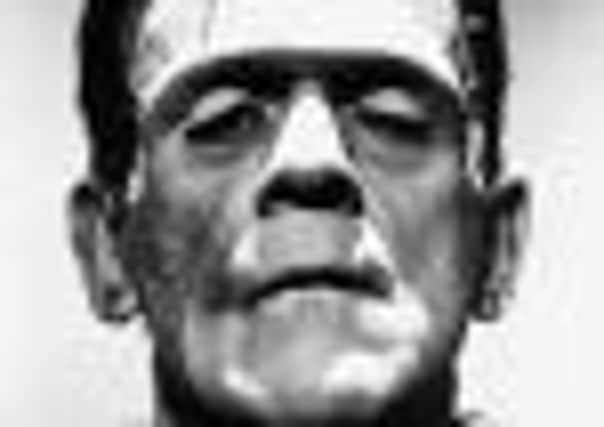The man behind the movie monsters


Christopher Lee once confessed to me his credo: “Do something other people can’t do, or won’t do, and you’ll be a success.”
By way of explanation he added: “Boris Karloff told me that, and Lon Chaney told it to him. I’ve never forgotten it.”
Advertisement
Hide AdAdvertisement
Hide AdIn the pantheon of movie monsters, Boris Karloff towers over all others. But unlike several of his contemporaries he never tired of his association with things that went bump in the night.
Karloff – “Karloff the Uncanny” they called him – is timeless. This year he has been dead for 42 years. Yet he remains the ultimate poster boy for horror aficionados everywhere. As well as the lumbering, brute-like figure of Frankenstein’s monster in the 1931 film, he was Mord, the club-footed executioner in Tower of London, Crowley-esque devil worshipper Hjalmar Poelzig in The Black Cat, fanatical Egyptologist Henry Morlant in The Ghoul, Imhotep in The Mummy, and resurrection man John Gray in The Body Snatcher. There were many, many more.
Yet Karloff’s appeal was universal. Who remembers the Westerns he made with Gary Cooper, the comedies with Abbot and Costello, performing on record as the Grinch (which won him a Grammy) or as Captain Hook for TV and stage? He was, clearly, more than a monster.
That’s the approach taken by author Stephen Jacobs in a mammoth 568-page biography of Karloff which has to be the last word on this stooping, lisping giant of the horror genre. Released by Sheffield publisher Tomahawk Press, it is the latest in a string of showbiz books whose subjects have included Will Hay and Patrick McGoohan.
Advertisement
Hide AdAdvertisement
Hide Ad“He was gently reared,” says Karloff’s daughter, Sara, from her home near Palm Springs.
“He went to fine schools, was an avid reader [and] was trained for the consular service. He loved and was passionate about the gentleman’s sport of cricket. None of this was a put-on or acquired. It was who and what he was. It came as a surprise to everyone that he wasn’t an axe murderer!”
Sara Karloff is the keeper of her father’s flame. She is at pains to stress his modesty, his lack of ego, his simple desire for honest hard work and the delivery of a good performance.
She wasn’t around her father for a lot of his life, and was very young when his career was at its zenith. Yet she re-lives his greatest movies via the fans – even though, by her own admission, “I’m such a wuss”.
Advertisement
Hide AdAdvertisement
Hide Ad“I don’t like scary movies. Period. I don’t like to be disquieted or discomforted. I leave the room during Murder, She Wrote,” she laughs.
Sara has been amazed at the amount of background Jacobs unearthed during his investigations. The book is particularly strong on Karloff’s early days when he drifted around America and Canada acting when he could but more often labouring as a truck driver or lumberjack.
“[My father] was 44 years old before he got his break and became an overnight success – after 20 years. He was ten years in British Columbia starving to death as a repertory theatre performer, sometimes getting paid, sometimes not. Sometimes he was painting and building sets; sometimes working for the British Railroad or British Electric Company – whatever it took to sustain himself.
“And then the next ten years he starved to death in Hollywood. As he said he was ‘fourth from the left in the third row’ as an extra and then became a bit-part player. Frankenstein was his 81st film and no-one had seen the first 80.” The story of Frankenstein is the stuff of movie lore. Universal Pictures wanted an unknown for the monster – Colin Clive was the mad doctor. Yet no-one paused to dwell on the 5ft 11ins Englishman made up to resemble a walking corpse.
Advertisement
Hide AdAdvertisement
Hide Ad“[In] Frankenstein my father was just a piece of meat to the studio. He wasn’t even invited to the premiere. He and my mother found themselves up in San Francisco visiting an old schoolmate of hers from college. It was playing up there, so the three of them went to the matinee.
“When the shot comes where my father is standing in the doorway and turns around, my mother’s college roommate screamed ‘Oh, God! How can you possibly live with such a monster?’”
I suggest that Karloff never tired of the horror tag, unlike contemporaries like Bela Lugosi, Vincent Price and Christopher Lee. Lugosi in particular had reason to resent Karloff for as Karloff’s career blossomed, Lugosi’s fell into decline.
“Bela may have regretted the decision that he made not to accept the Frankenstein role, [because] he turned it down,” Sara recalls. “It turned out to be not the best decision he could have made for his own career. In Bela’s position I would hate my father – be jealous and envious. The film made my father’s career; Bela’s career went to hell in a hand basket after that. How could you feel anything but anger and resentment? Bela was not generous of spirit as a person.”
Advertisement
Hide AdAdvertisement
Hide AdIt’s 80 years since Boris Karloff played Frankenstein’s monster. In the 1950s he passed the baton to Christopher Lee. And when Lee abdicated the throne in the 1970s he sought a princeling to wear his cape. There was no-one. Thus Karloff and his gallery of grotesques remain frozen in time. “Young people know the words to these films verbatim,” says Sara. “They just have multi-generational appeal. It’s amazing to me how iconic some of these roles have become. What long legs these legacies have.”
Boris Karloff – More Than a Monster by Stephen Jacobs is published by Tomahawk Press.